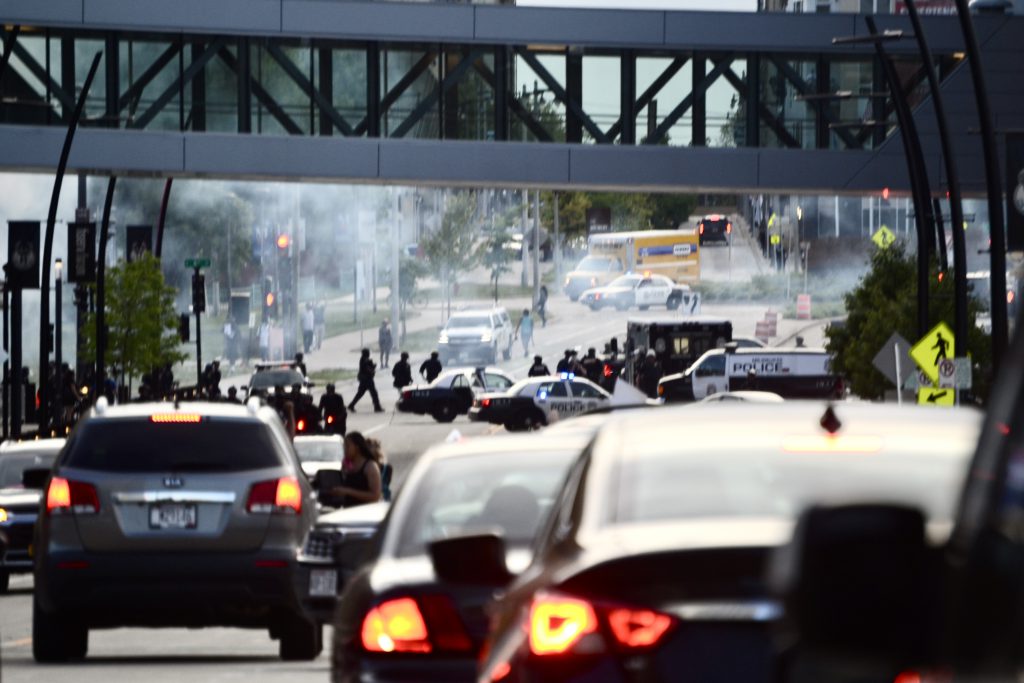Tear Gas Is Dangerous, Experts Say
And may increase risk of getting COVID-19. Mayor, others have urged police to stop its use.
Tear gas has long been banned on the battlefield as a dangerous chemical weapon.
“In 1918, the International Committee of the Red Cross referred to chemical weapons like tear gas as ‘barbaric’ and ‘criminal.’ In 1925, the Geneva Protocol banned the use of chemical weapons in warfare. Again, in 1997, the international community reinforced its commitment to ban the use of dangerous chemical weapons,” the ACLU recounts.
But there has always been an exception for law enforcement officers using it for riot control. And police across the nation, including in Milwaukee, have been using tear gas against marches protesting the killing of George Floyd. It was even used in Seattle after the mayor there banned its use for 30 days.
“The escalation of tear gas use we’re seeing now really seems unprecedented,” Sven-Eric Jordt, a professor of anesthesiology at Duke University, told The Guardian.
Last week, Assistant Milwaukee Police Chief Michael Brunson, told the Milwaukee Common Council the use of rubber bullets and tear gas is a change from police practices in the 1960s that resulted in deaths in many encounters, as Urban Milwaukee reported. “Law enforcement options at those times [the 1960s] were a handgun and a billy club,” said Brunson. The change to rubber bullets and tear gas was done “to use the minimal amount of force to get the situation under control,” Brunson said.
But the use of “less lethal” weapons, as rubber bullets and tear gas have been described, has been questioned by many. Last week an open letter signed by nearly 1,300 medical and public health professionals called on the police to stop using “tear gas, smoke or other respiratory irritants, which could increase risk for COVID-19 by making the respiratory tract more susceptible to infection, exacerbating existing inflammation and inducing coughing.”
“They are really pain nerve gases. They are designed to induce pain,” Jordt told the publication.
“When inhaled, the pain induces people to cough. The compound degrades the mucus membranes in your eyes, nose, mouth and lungs — the layers of cells that help protect people from viruses and bacteria,” the story noted
A 2014 study by the U.S. military on thousands of recruits who were exposed to tear gas during training exercises found it later left them at higher risk for contracting influenza, pneumonia, bronchitis and other respiratory illnesses.
Similarly, it might weaken the body’s ability to stave off COVID-19, leaving demonstrators at higher risk, as Dr. Purvi Parikh, an allergy and immunology doctor at NYU Langone Health told the publication: “If your lungs are already wheezing and coughing, working hard to expel this tear gas or this irritant, it’s unable to have that reserve to fight off any infection, whether a virus or bacteria.”
Dr. Peter Chin-Hong, an infectious disease physician who helped draft the open letter on tear gas, told The Guardian it can cause tears, saliva and mucus to stream from demonstrators’ eyes and noses, which will help spread COVID-19 from anyone who has it. “It’ll cause people to shout and scream, propelling droplets of these fluids – which could be carrying coronavirus – and giving them superpowers, to spread much farther than six feet,” he said.
The use of tear gas “would increase the risk of progression from asymptomatic infection to symptomatic disease,” Dr. John Balmes of the University of California, San Francisco told Pro Publica
Using tear gas “in the current situation with COVID-19 around is completely irresponsible,” Jordt told National Public Radio.
Parikh told Pro Publica its use could be particularly dangerous for any children at protests. “Their lungs and immune system are still developing, and tear gas could lead to neurological problems or permanent skin or eye damage if it’s not washed off quickly,” the story noted.
In dense city neighborhoods, tear gas can also seep into nearly homes and apartments and leave behind a residue that can present serious health hazards,” the story noted. It can “seep into porous materials like furniture, mattresses, clothing, carpet and even hardwood floors, and continue to irritate the mucous membranes of anyone” living there.
The ACLU of Wisconsin has called on Milwaukee police to stop using tear gas, charging that “The use of it in the midst of the COVID-19 pandemic, caused by a respiratory virus, is inexcusable.”
Mayor Tom Barrett has called for a drastic limitation on its use. “I don’t think we should be using tear gas unless it’s a very, very, very serious situation,” he said.
Urban Milwaukee contacted the Milwaukee Police Department to ask how often tear gas has been used during the 11 days of protest, and will update this story should we hear a reply.
If you think stories like this are important, become a member of Urban Milwaukee and help support real, independent journalism. Plus you get some cool added benefits.
More about the 2020 Racial Justice Protests
- Plea Agreement Reached On Long-Pending Sherman Park Unrest Charges Involving Vaun Mayes - Jeramey Jannene - Oct 17th, 2024
- Rep. Ryan Clancy Settles With City Following 2020 Curfew Arrest - Jeramey Jannene - Dec 12th, 2023
- Supervisor Clancy Applauds Settlement in Clancy vs. City of Milwaukee - State Rep. Ryan Clancy - Dec 12th, 2023
- Tosa Protest Assails Federal Court Decision Exonerating Police - Isiah Holmes - May 9th, 2023
- Wauwatosa ‘Target List’ Trial Begins - Isiah Holmes - May 3rd, 2023
- Shorewood Spitter Found Guilty For 2020 Protest Confrontation - Jeramey Jannene - Apr 20th, 2023
- City Hall: City Will Pay 2020 George Floyd Protester $270,000 - Jeramey Jannene - Feb 14th, 2023
- Tosa Protest Tickets Dismissed - Isiah Holmes - Jul 21st, 2022
- Op Ed: ‘We Need More’ - Charles Q. Sullivan - Mar 4th, 2022
- Milwaukee Officers Circulate “2020 Riot” Coins? - Isiah Holmes - Nov 14th, 2021
Read more about 2020 Racial Justice Protests here
Murphy's Law
-
The Last Paycheck of Don Smiley
 Dec 17th, 2025 by Bruce Murphy
Dec 17th, 2025 by Bruce Murphy
-
Top Health Care Exec Paid $25.7 Million
 Dec 16th, 2025 by Bruce Murphy
Dec 16th, 2025 by Bruce Murphy
-
Milwaukee Mayor’s Power in Decline?
 Dec 10th, 2025 by Bruce Murphy
Dec 10th, 2025 by Bruce Murphy






















